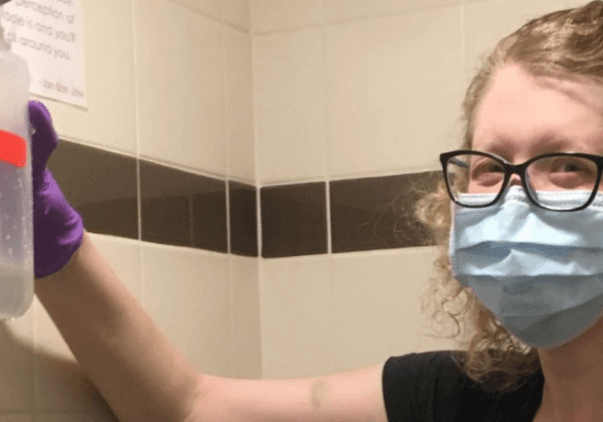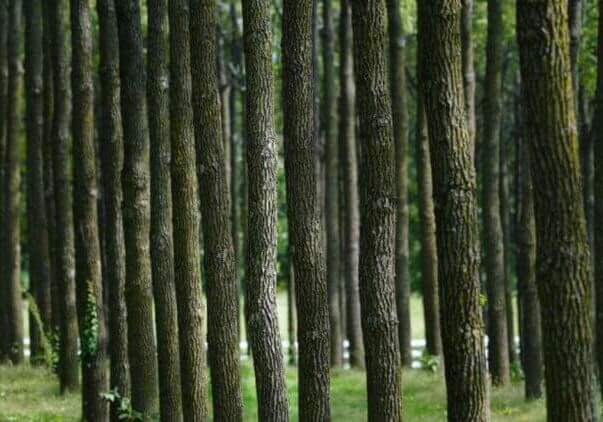“When I’m looking at my students I’m always looking at their futures,” Eva Haviarova, forestry and natural resources professor of wood products, said. “I want them to have a good education, a good life and options.”
Haviarova’s outlook transcends the physical boundaries of campus. Through her Extension work and community projects, Haviarova’s students include anyone passionate about woodworking and furniture design.
One of her off-campus projects involves working with the company Purposeful Design in Indianapolis. Established in 2013 by businessman David Palmer, Purposeful Design is a custom furniture building business that trains and employs men whose lives have been derailed.
“We hire men who are coming from difficult pasts and situations, whether it’s incarceration, addiction or homelessness,” Palmer explained. “We train them to make beautiful, custom, hand-crafted furniture that we then sell to schools, hospitals and local businesses. We’re not just doing it out of a love of furniture, but because we love seeing the changes it brings about in these men’s lives.”
“When I’m looking at my students I’m always looking at their futures. I want them to have a good education, a good life and options."
Purposeful Design employs roughly 20 men at a time and they stay in the position for years, learning a trade and reassembling the foundations of their lives, which for many begins with financial stability.
Haviarova plays an essential role in developing the skills of these craftsmen. For the past several years, she has taught quarterly workshops at Purposeful Design, sharing her expertise in sustainable furniture design, aesthetic and strength principles. She also offers a more intimate look at wood, discussing varieties of wood species at the microscopic level, reasoning that a better understanding of the science behind wood molds more intentional woodworkers.
Furniture in various stages of completion by Purposeful Design craftsmen.
“I tend to guide these workshops towards the material sciences,” Haviarova explained. “You must understand science if you want to deliver a high-quality product. Why does wood shrink and swell, what wood type works well for what purpose, these are all things they should understand. I find the men are endlessly inquisitive.”

Isaiah Clary, who has worked at Purposeful Design for about three years, said connecting with experts like Haviarova through her workshops is a highlight of his job. Clary said it allows him to expand his repertoire and develop as a craftsman, ensuring he and his coworkers don’t get stuck in creative ruts.
“That connection and knowledge offered to us, that’s everything,” Clary reflected. “I used to like to isolate, keep to myself, but this kind of work, these kinds of workshops, are all about communication and building accountability, which was previously lacking for me.”
In addition to developing their skills as craftsmen and building a profession, Haviarova said woodworking can improve healing.
“There have been scientific studies that show surrounding ourselves with natural material, with wood, is calming,” she continued. “It’s similar with hands-on work. Building something can be spiritually nourishing, creating something beautiful is almost like a meditation.”
Clary agreed, adding that the benefits of working with wood pervade every aspect of his life. “Since I started here I never go hungry, in my stomach, my head or my heart.”
Anna Kiemel, a 2020 Purdue graduate, recently began work at Purposeful Design as a project manager. She received her degree in industrial design and took Haviarova’s class on sustainable furniture design. She said the professor’s depth of knowledge, attention to detail and love of woodworking has permeated the culture at Purposeful Design. And although she only recently started with the company, the therapeutic benefits of working closely with wood products appear evident and are one of the many reasons she personally enjoys furniture design.
“Anything that brings you back to nature is positive,” Kiemel said. “The work being done here isn’t masking the materials’ connection to the natural world, it’s emphasizing it.”
This marriage of science with the more spiritual elements of woodworking is what makes the profession singular, Palmer said. “I hear craftsmen say it can take an entire lifetime to be a good woodworker, and that may be true,” he added. “But for our guys to participate in making something beautiful and useful, that’s a special feeling for them. And to have experts from Purdue, like Eva, coming in to share their time and knowledge with us, that is so validating.”
As with most student-educator relationships, Haviarova said, the benefits are mutual.

“I enjoy my work with Purposeful Design. While I am providing training and intellectual development, I think these experiences also show me how to be a better teacher and offer me the chance to give back to society,” she added. “It’s like a chain reaction. You provide skills to someone and they, in turn, have the chance to support themselves and loved ones and begin giving back to society in turn. It’s about so much more than just developing skills and providing training. Woodworking is also about the soul.”
New ABE professor’s water safety research assumes prominent role during pandemic
Starting in a new position during the middle of a pandemic is challenging. For Caitlin Proctor, assistant professor of agricultural and biological engineering (ABE) and environmental and ecological engineering, it was also in keeping with an already tumultuous year.
Proctor began in her position this semester, after two years as the Lillian Gilbreth Postdoctoral Fellow in the College of Engineering. During her fellowship, Proctor researched drinking water and the ecological and biological interactions that affect its safety.
Read Full Story >>>Purdue Extension: Building resilience in communities
Crises often leave families feeling helpless and out of control. The COVID-19 pandemic is no exception as Hoosiers face the loss of jobs, resources, life experiences and social contacts. With the help of Purdue Extension, Purdue’s College of Health and Human Sciences is helping families cope with change and even find positivity during the pandemic.
Read Full Story >>>Purdue pursues industry hardwood partnerships through NSF-backed center
The Center for Advanced Forestry Systems (CAFS), a National Science Foundation-funded Industry/University Cooperative Research Center, of which Purdue’s Hardwood Tree Improvement and Regeneration Center is a founding member, develops partnerships with forest-related companies to help solve pressing needs in their industry.
Read Full Story >>>

